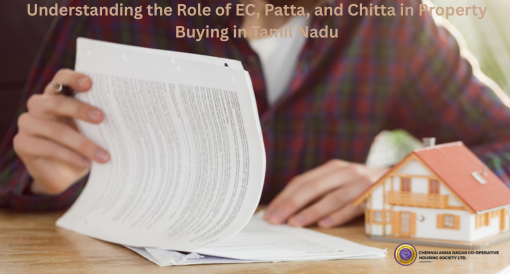CALL US : 044 - 4265 2238, 90430 42627, 90940 49786
MAIL US : ch40coophousesty@gmail.com
CACHS.IN
TRUELY HOUSING SOCIETY
CALL US : 044 - 4265 2238, 90430 42627, 90940 49786
MAIL US : ch40coophousesty@gmail.com
TRUELY HOUSING SOCIETY

Buying a property is a dream for many in Tamil Nadu. But beyond the price, location, and layout of the property, it’s essential to verify legal documents to ensure a secure and dispute-free investment. Among the most crucial documents in any property purchase in Tamil Nadu are the Encumbrance Certificate (EC), Patta, and Chitta. Understanding their role is key to making informed and confident real estate decisions.
In this blog, we’ll simplify these terms, explain their significance, and show you why every buyer in Tamil Nadu should check them before making a purchase.
An Encumbrance Certificate (EC) is a legal document that provides a record of all financial and legal transactions related to a property over a specified period. It shows whether the property is free from legal dues, loans, or mortgages.
? Why is EC important?
Proves clear ownership of the property.
Ensures there are no outstanding debts or legal claims.
Mandatory for obtaining home loans or property registration.
???? How to get it?
Apply through the Tamil Nadu Registration Department portal or visit the Sub-Registrar’s Office.
Provide property details and the required time period.
A Nil Encumbrance Certificate means no encumbrance (loan or legal liability) exists.
Patta is a government-issued document that proves the ownership of land. It is issued by the Tamil Nadu Revenue Department in the name of the property owner and includes important details like:
Owner's name
Survey number
Subdivision number
Property classification (residential, agricultural, etc.)
Area in square feet
Tax details
? Why is Patta important?
Establishes the lawful possession of land.
Required during property registration and transfer of ownership.
Necessary for availing electricity and water connections.
Helpful in case of land disputes or litigation.
???? How to get a Patta?
Apply through the TNeGA (Tamil Nadu e-Governance Agency) portal or visit the local Taluk Office.
Submit sale deed, previous Patta copy (if available), and identity/address proof.
Chitta is another land-related document that classifies land based on its usage. It is maintained by the Village Administrative Officer (VAO) and contains details like:
Type of land: Wetland (Nanjai) or dryland (Punjai)
Ownership details
Survey number and extent of land
While Patta focuses on ownership, Chitta provides information about land classification and revenue.
? Why is Chitta important?
Crucial for agricultural land purchases.
Helps verify whether the land is suitable for residential development.
Used by banks to assess risk before approving loans.
???? Note: In recent years, the Tamil Nadu Government has merged Patta and Chitta into a single document available on the TNeGA portal for ease of access.
When buying a property—especially a plot or land—in Tamil Nadu, the EC, Patta, and Chitta together ensure:
Document Purpose
EC -Confirms the property is free from legal/financial liabilities
Patta - Proves legal ownership and helps in mutation
Chitta- Provides land classification (agricultural or residential)
Avoid legal disputes in the future.
Prevent buying encumbered property.
Establish clear chain of title.
Help with bank loan approval.
Peace of mind in your investment.
Skipping document verification in a resale property.
Assuming EC is sufficient – you need Patta and Chitta too.
Not checking if the Patta is in the seller’s name.
Failing to verify the land classification before purchasing.
Believing verbal assurances instead of checking legal documents.
To promote transparency, the Tamil Nadu government has digitized these services.
For EC: Visit tnreginet.gov.in
For Patta/Chitta: Visit eservices.tn.gov.in
You can download digital copies using survey numbers and other property details.
Imagine you're planning to buy a plot near Tambaram, Chennai. The seller shows you the sale deed but not the Patta or EC. If you skip verifying these:
You might end up buying mortgaged land (if EC has encumbrances).
You might face legal issues if the Patta is not updated.
If the Chitta shows agricultural land, you can’t construct a house without conversion.
Always insist on these documents and cross-check their authenticity.
In Tamil Nadu, Encumbrance Certificate, Patta, and Chitta form the legal backbone of any land or plot transaction. Ignoring or overlooking them can lead to legal trouble, financial loss, and ownership disputes. Whether you're a first-time homebuyer or an experienced investor, understanding the role of these documents is critical for safe, smart, and stress-free property buying.
Before you invest in a property, consult with legal professionals or trusted institutions like Chennai Anna Nagar Co-operative Housing Society Ltd, who offer expert assistance in document verification and property approvals. With the right information and guidance, you can secure your future and make a confident property investment.
Copyright © Chennai Anna Nagar Co-operative Housing Society Ltd . | Web Designed and Developed by Glint Creatives | Client email